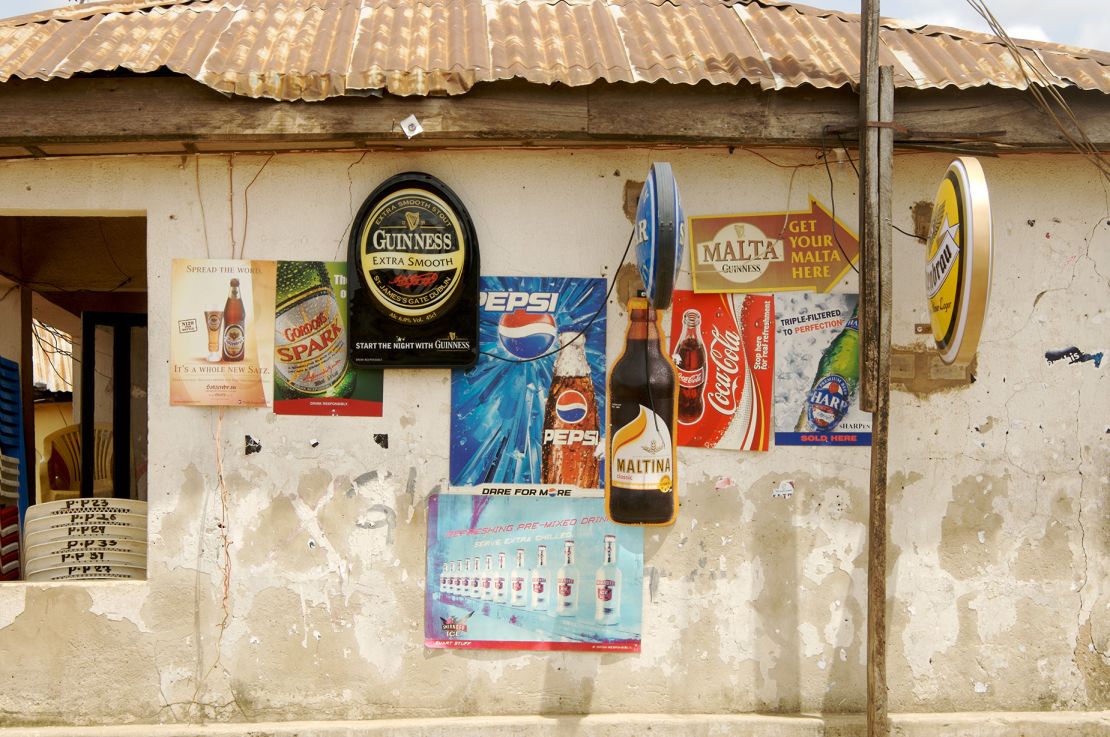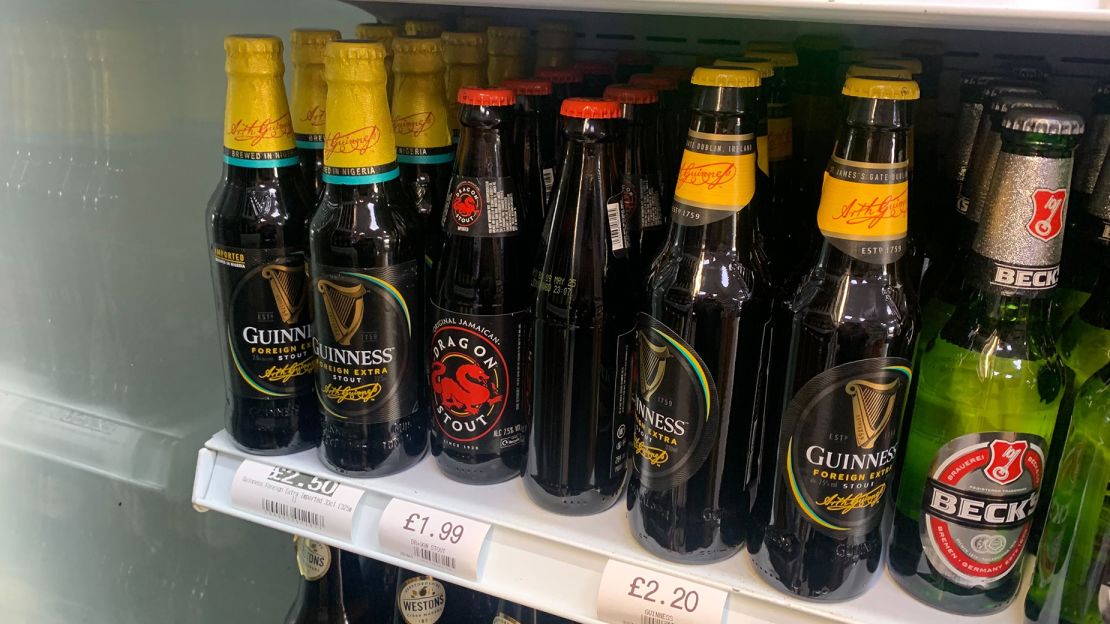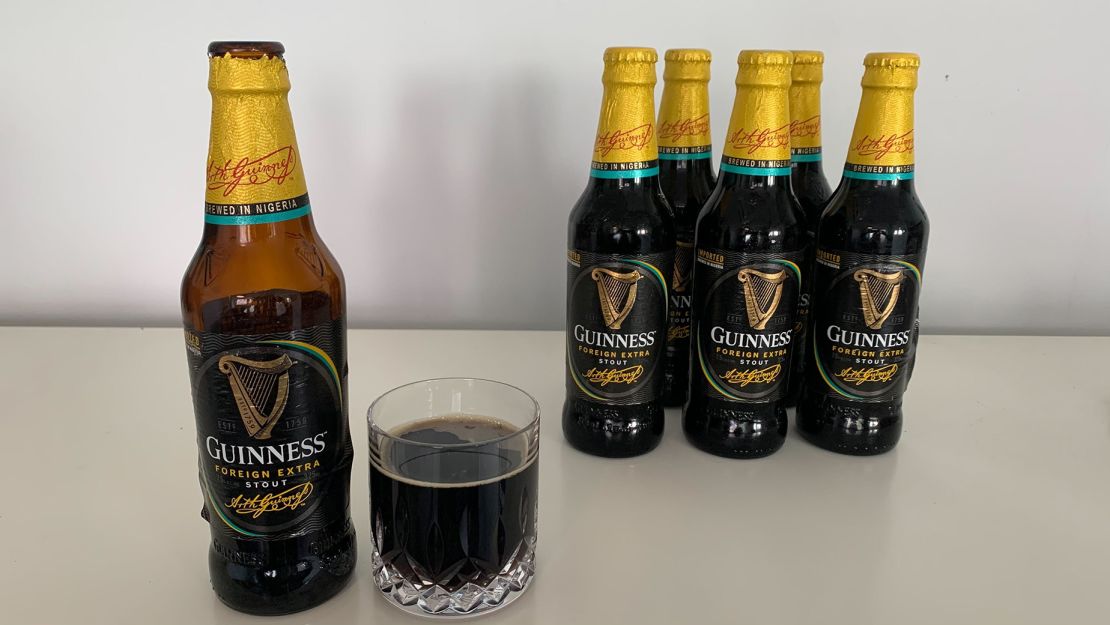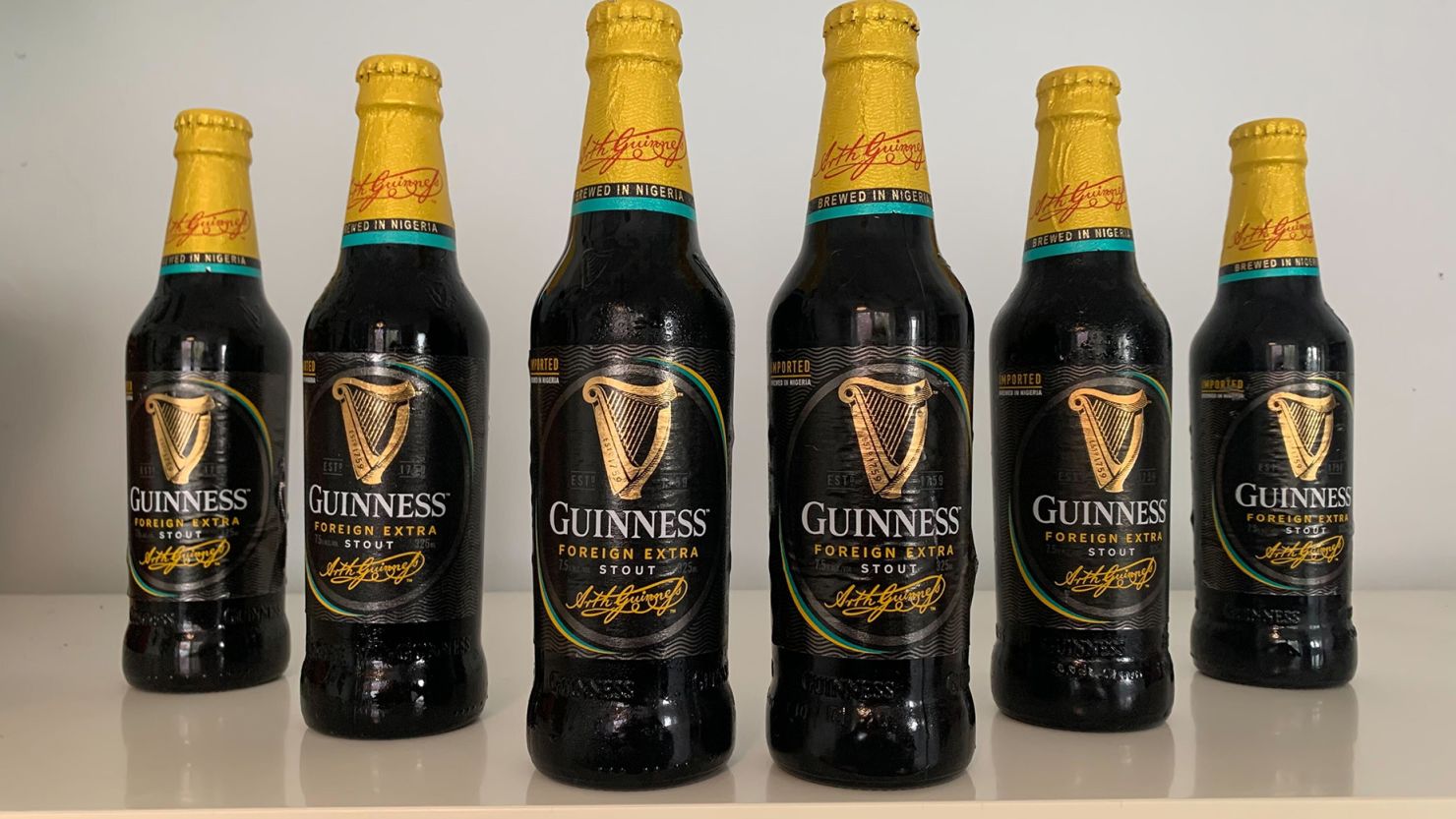Femi Oyebade, a Nigerian diasporan for more than 30 years and a Guinness beer connoisseur, assures me that there is a stark difference between Irish Guinness and Nigerian Guinness. Chalk and cheese won’t suffice in defining the distance between the two.
Nigerian Guinness has weight in your mouth and is sumptuously smooth. It isn’t as bitter as Irish Guinness and has a lovelier, frothier head. Its sugar content is higher. So, Oyebade tells me, for health reasons a drinker should reduce their intake of pounded yam and other “swallow”-carbs to accommodate the extra blood sugar.
The alcohol content of Nigerian Guinness is 7.5%, almost twice as strong as the Irish 4.2%. Oyebade insists you can never drink Nigerian Foreign Extra Import and go back to Dublin dry stout. Never, ever. America, where Nigeria’s Foreign Extra Import Guinness is not typically available, is worse off for its absence.
I found these arguments fascinating, especially because my love of Guinness beer is based on its bitter-sweet malted aromatics and their potential as a cooking ingredient.
I bake stout and apple wheaten bread regularly with an overdose of Nigerian Foreign Extra Import, switching buttermilk for stout.
I slow-cook stewing beef in three-quarters of a can with carrots, leeks, dried Cameroonian peppers and honey.
But I can’t drink it. I’m a philistine whose appreciation of the beverage really starts and ends with pleasurable inhalation of the fragrance of cooking Guinness. I suppose that is also a kind of sensory imbibing that can leave you “happy.” There is something about Guinness’s distinct aromatics that hits the spot.
‘Guinness gives you power’

How do you drink your stout? It’s an easy question in Nigeria. The intensely dark, bitter, creamy, deliciously frothy-headed elixir with an intoxicating bouquet is democratically drunk all over the country by all.
That’s everyone from lactating mothers, perilously sipping thanks to the original Nigerian Guinness adverts from the 1960s that proclaim “Guinness gives you power” and “Guinness is good for you,” to the octogenarian at death’s door terrified of hospitals and sure Guinness cures all ails.
Nigeria is the second largest Guinness-drinking nation worldwide. We drink more Guinness than the Irish. And we were the first Guinness-brewing outpost of note, with a representative brew – not barley but maize, sorghum and a unique yeast – created for our national palate.
There is a scientific postscript for Femi Oyebade’s avowal of our Guinness’ superiority. It was purposefully tailored to our taste buds using grains that we grow locally and eat every day.
The adroit advertising from the 1960s – “Black is Beautiful”– helped Guinness cross firmly from cultural émigré to Nigerian indigene decades ago.
In other words, the Guinness brew pretended that it was one of us (Black, beautiful and strong). It attested to how we saw ourselves and plugged into our national identity and we forgot that it was imported.
Low chairs and highlife music

The Foreign Extra Import – our own export of the Nigerian brew – can be found sitting on the shelf (in a 33-centiliter bottle) in every good London corner shop, you just have to know to ask.
It’s an efficient identifier. If you say to the man behind the counter “Foreign… Extra… Import,” he will stake his life that you are Nigerian. Our brew is apparently “less” bitter, and roasted darker, than the original Irish Guinness Draught in a can or pub-poured pint glass.
We drink differently too.
Because it has been many years since I was back in Nigeria, I turned to Nigerian poet, writer, psychiatrist and friend Dami Ajayi for help with beer parlor nostalgia
Ajayi tells me there used to be a beer parlour at “Yaba Left” – the informal name of the federal neuropsychiatric hospital in Yaba, Lagos.
It was a purpose-built building situated in the old railway compound. The upper floor, called the social center, was forsaken and unhappy but there was a kitchen downstairs rented out to a catfish and pepper soup vendor with a gold tooth.
At 4 p.m. every day, the plastic tables and chairs – branded with the beers Gulder, Trophy, Goldberg and so on – would appear in the compound of the building and men would start to fill them.
They were rarely alone – no, they were accompanied by women (notably not their wives). The clientele was mostly “bring our girlfriend for fish” men, between 40 and 50 years old, with women half their age. Doctors from the psychiatric hospital and people visiting patients were also part of the gatherings.
Outside the perimeter of the building were stalls – Aunty Toyin selling peppered snails and yam, Shehu, the suya smoked meat man with his speciality “tozo suya” beef and someone else selling noodles and eggs.
The beer parlor closed at 11 p.m. and people who lived and worked in the area would drink their beer, their Guinness, eat their suya or pepper soup, talk about politics and other affairs, and go home or move on to the guest house nearby.
In summary, meat, stout and an essential playlist of classics like Chief Commander Ebenezer Obey’s “The Horse, the Man and his Son,” or “Ero Mi Ko Lonso,”Tunde Nightingale and his Highlife Boys’ “The Bird That Sings All the Night,” Ayinla Omowura’s “Awa Ki ise Olodi Won,” and Dr. Victor Olaiya’s languid crooning of “Baby Jowo.”
Sometime in the mid-2010s, there was a Friday night live band. The social center was created with the singular goal of removing the stigma of the psychiatric hospital’s presence in the community.
Until its demolition years later, it never achieved its goal. The memory of the beer parlour remains indelible as the place nearby to unwind and drink your “Odeku.”
‘Give him an Odeku’

We don’t bother with grandiose descriptive words. Guinness is Guinness. Or it is a big stout, Odeku (60 centiliters), or a small stout, Lanko (33 centiliters). Lanko is so named because it sounds like “lanky” and Odeku sounds like an onomatopoeic neologism for someone stocky and strong.
It says something about the ubiquitousness of Guinness in Nigeria that our words for the drink have transcended the division of 500 languages and become big vs small, Odeku vs Lanko. The size of the Guinness beer bottle you buy for a friend or new acquaintance points to how highly you esteem them. There is no middle ground where this is concerned.
A demand to the server, “Give him an Odeku,” is flattery plus flourish. An Odeku is twice the esteem of a Lanko or a Heineken. A Nigerian man flirting with a woman won’t buy her a big bottle of Guinness in a beer parlor; he will buy her a Lanko with a glass. But then, of course she can drink as many Lankos as she likes – enough to equal the Odekus – because the protocols of respectful courting have already been observed.
In 1992, Nigerian Breweries attempted to create a new brew to rival Guinness and came up with Legend Extra Stout. It contains the eluded barley with sorghum and caramel, but more than 30 years later it has still failed to topple Guinness from its throne.
The Guinness brewery in Lagos is almost as old as Nigerian independence, having been brewing Guinness Foreign Extra Stout since 1963 – just three years after the country became independent from the UK.
Femi Oyebade speaks for many when he says there is no match for Nigerian Guinness in smoothness or cultured mouth-feel – not even close.
‘Plenty pepper’

My own favourite excuse for “drinking” stout isn’t anything to do with old wives’ tales masquerading as medical therapy nor winding down at the weekend. It is back to the Irish beef and Guinness stew with plenty of hot pepper to suit my Nigerian palate.
A good-size filet is the ideal cut. The meat is cut up in generous chunks and browned in vegetable oil in a pan. When it has a good glaze, I put it in a bowl and set it aside. I then fry two chopped-up onions, two large carrots cut up in big pieces and one finely chopped leek in the same oil that I browned the meat in. This deglazes the pan and helps the amalgamation of the meat and vegetable flavors.
I then put my meat back in with the vegetables and add about a handful of flour; three quarters (or more) of a can of Guinness Foreign Extra Import; salt; lots of ground-dried Cameroonian pepper and about one-and-a-half to two tablespoons of honey. A little bit of water also helps.
The dish is covered and left in the oven on a low setting to cook to absolutely delicious perfection; an hour is certainly not too long.
The smell of cooking onions, carrots, meat and stout is indescribable. The “plenty pepper” lifts it out of the melancholy of a London gray sky; helps it to hit that spot. The cooked carrots melt in the mouth oozing the juices of beef and malt. Beef and stout stew tastes so much better the next day. I serve it simply with steamed aged rice.
A Nigerian-born writer, visual artist and illustrator, Yemisi Aribisala is best known for her thematic use of food writing to explore Nigerian culture. She lives in London.





